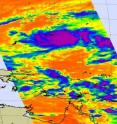Tropical Depression 02W forms in northwestern Pacific
The second tropical depression of the northwestern Pacific tropical cyclone season has formed and is currently located about 235 miles east-southeast of Yap, Micronesia. NASA's Aqua satellite captured infrared, microwave and visible images of Tropical Depression 02W (TD 02W) early this morning. When NASA's Aqua satellite flew over TD 02W this morning, Monday, March 22 at 0405 UTC (12:05 a.m. EDT), infrared imagery showed a large area of strong convection in the storm's center, where thunderstorm cloud tops were highest. Those cloud top temperatures were colder than -63 degrees Fahrenheit, indicating strong thunderstorms with moderate to heavy rainfall.
By 11 a.m. EDT (1500 UTC or 1 a.m. local time) today, TD 02W had maximum sustained winds near 35 mph (30 knots) and was near 8.4 degrees North latitude and 141.4 degrees East longitude. TD 02W is about 100 miles southeast of Fais, 150 miles east-southeast of Ulithi and 235 miles east-southeast of Yap. It was moving northwest near 10 mph (9 knots), and generating 10-foot high waves.
A tropical storm warning remains in effect for Yap: Fais and Ulithi in Yap State. The tropical storm watch for Ngulu in Yap state and Kayangel in the Republic of Palau has been cancelled. TD 02W is forecast to pass between Yap and Ulithi late this afternoon (local time). Tropical depression 02W is expected to slowly intensify...and be a minimal tropical storm by the time it reaches Yap and Ulithi.
Rising seas generated by TD 02W's winds will cause high surf across the Republic of Palau and Yap State through Wednesday, March 24.
Source: NASA/Goddard Space Flight Center
Articles on the same topic
- Winds blow off Omais' thunderstorm topsFri, 26 Mar 2010, 21:22:58 UTC
- Imani on the weakening on weekendFri, 26 Mar 2010, 21:22:57 UTC
- Imani reaches cyclone status 'by the tail'Thu, 25 Mar 2010, 17:19:52 UTC
- Tropical storm Omais weakens and doubles in sizeThu, 25 Mar 2010, 17:19:50 UTC
- 02W renamed Tropical Storm Omais, staying at seaWed, 24 Mar 2010, 20:37:29 UTC
- Tropical Storm Imani making a question mark in the Southern Indian OceanWed, 24 Mar 2010, 20:37:28 UTC
- NASA's Aqua Satellite sees a tight Tropical Storm 21STue, 23 Mar 2010, 18:32:28 UTC
Other sources
- Imani on the weakening on weekendfrom Science BlogSun, 28 Mar 2010, 3:14:13 UTC
- Winds blow off Omais' thunderstorm topsfrom Science BlogSun, 28 Mar 2010, 3:14:09 UTC
- Imani on the weakening on weekendfrom PhysorgFri, 26 Mar 2010, 23:07:16 UTC
- Winds blow off Omais' thunderstorm topsfrom PhysorgFri, 26 Mar 2010, 23:07:11 UTC
- Imani on the weakening on weekendfrom Science BlogFri, 26 Mar 2010, 22:21:31 UTC
- Winds blow off Omais' thunderstorm topsfrom Science BlogFri, 26 Mar 2010, 22:21:29 UTC
- Tropical storm Omais weakens and doubles in sizefrom Science BlogThu, 25 Mar 2010, 17:50:38 UTC
- Imani reaches cyclone status 'by the tail'from Science BlogThu, 25 Mar 2010, 17:50:30 UTC
- Imani reaches cyclone status 'by the tail'from PhysorgThu, 25 Mar 2010, 17:50:02 UTC
- Tropical storm Omais weakens and doubles in sizefrom PhysorgThu, 25 Mar 2010, 17:22:38 UTC
- 02W renamed Tropical Storm Omais, staying at seafrom PhysorgWed, 24 Mar 2010, 21:14:08 UTC
- Tropical Storm Imani making a question mark in the Southern Indian Oceanfrom PhysorgWed, 24 Mar 2010, 20:49:17 UTC
- Tropical Storm Imani making a question mark in the Southern Indian Oceanfrom Science BlogWed, 24 Mar 2010, 20:28:39 UTC
- 02W renamed Tropical Storm Omais, staying at seafrom Science BlogWed, 24 Mar 2010, 20:28:37 UTC
- NASA's Aqua Satellite sees a tight Tropical Storm 21Sfrom Science BlogTue, 23 Mar 2010, 20:07:16 UTC
- NASA's Aqua Satellite sees a tight Tropical Storm 21Sfrom PhysorgTue, 23 Mar 2010, 19:14:24 UTC
- Tropical Depression 02W forms in northwestern Pacificfrom Science BlogTue, 23 Mar 2010, 4:28:26 UTC
- Tropical Depression 02W forms in northwestern Pacificfrom PhysorgMon, 22 Mar 2010, 22:21:06 UTC
- Tropical Depression 02W forms in northwestern Pacificfrom Science BlogMon, 22 Mar 2010, 22:07:17 UTC
